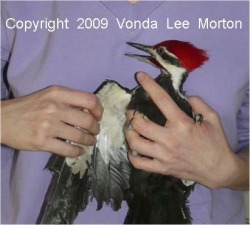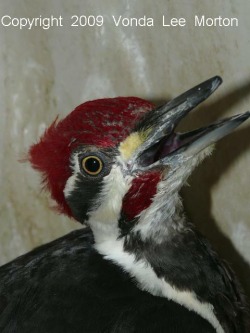While February was a "slow" month in terms of intakes, it more than made up for its lack of numbers with the horrific conditions the intakes were in when they arrived–see the Feb. 15 post for details. The past two weeks have been blessedly quiet, a break I really needed to gear up for baby season, which is rapidly approaching. All I’ve had to deal with is Harvey Wallbanger’s stubborn refusal to begin using his wing!
To refresh your memory, Harv, an adult male pileated woodpecker, came in on New Year’s Eve with a broken wing. Three weeks ago, we unwrapped that wing and, of course, after nearly six weeks of not being able to use it, Harv refused to even move it. Early last week, I took his stubborn little feathered butt back to Smalley’s for an X-ray to confirm that the wing had indeed healed correctly. It had healed beautifully; Harv is just being ornery–something his species excels at.

We’re doing PT three times daily, stretching and manipulating the wing to restore movement and remind Harv that he does have a functional right wing. Yeah, he luuuvs his PT: pecks at my hands (got me under the nail the other day–now THAT felt just lovely!), claws me, snaps at my hair and clothing, slams his head backward into my chest, tries to shimmy up my chest to get in range to peck at my eyes as I’m looking down at him while working the wing...such a winning personality!
The good news is that the wing does appear to be slowly loosening up, so I have every expectation at the moment that he’ll be releasable in the near future.
As I mentioned at the beginning of this post, baby season should be kicking into high gear fairly quickly–some rehabbers already have their first babies of the season–and that means it’s time to remind people that keeping wildlife without the proper permits is against the law, even if you plan to release it. Georgia state law prohibits the possession of wild animals without a permit, and federal law prohibits the possession of wild birds without a permit. If you know of people who find wild babies of any species, please alert them to these facts and have them contact me at 478-697-5319 or call the DNR hotline at 800-241-4113 for the rehabber nearest them. If you’re outside Georgia, call your state’s Department of Natural Resources or Game & Fish Division for the number of a rehabber licensed by your state.
For more tips on what to do if you find a wild baby, see the section "I found a wild baby-what do I do?" (http://www.laurenswildliferescueinc.org/i-found-a-wild-baby---what-do-i-do.html ) on this website or call me for more detailed advice. There are times that intervention is really not necessary or is needed only in the form of making sure the babies are unmolested until the parents can reclaim them: mother squirrels are excellent at re-nesting their babies, given a chance, for example; and unless you see his mother’s corpse, it’s generally not a good idea to move a fawn.
This time of year, songbirds will begin looking for suitable nesting sites, and I understand from raptor rehabber Steve Hicks that owls already have babies in the nest and hawks are beginning their mating rituals. With this in mind, please remember that disturbing a nest with eggs or young, whether songbird or raptor, is a violation of federal law.
Our state’s wildlife is a part of our inheritance and a part of our legacy to future generations. I’m all for nature taking its course, but 99% of the time, it’s human activities (including not supervising cats, dogs and children) that create orphaned, injured or unnested babies, so take the time to do the right thing and get these babies the help they need to survive, ensuring that this rich legacy will remain intact for future Georgians.

 RSS Feed
RSS Feed
